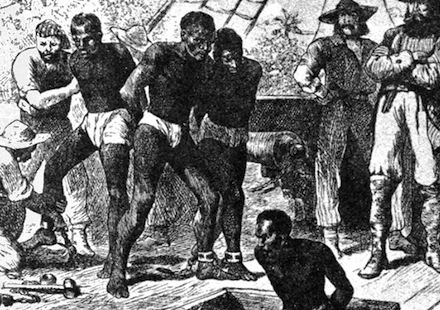Slave North -- "Slavery in Rhode Island"
Lady Jane, January 23 2013
Slavery is commonly problematized as a Southern issue within the study of American history, but it was practiced throughout the colonies and early United States until the turn of the 19th century.
In no place in the North was this more prevalent than Rhode Island. Slave North covers this in detail with citations. At the time of the American Revolution the state had a black population (mostly slave) estimated at 6-7% (double the percentage in any other New England state). Slaves were not emancipated by law in that state until 1784, and even then the process was gradual.
Even less savory was Newport, Rhode Island's status as the center of the American slave trade. Until this trade was forced underground1 by the prohibition of the trade in 1808, it represented the "number one financial activity" for the state.
One estimate puts the number of slaves imported by Rhode Island merchants at slightly over 100,000 in the century before 1808, a number which would represent 20% of all slaves ever imported to the United States. In the first years after the Revolution, it is estimated that Rhode Island merchants were responsible for importing an outright majority of the slaves who arrived.
Few were more prominent in the trade than the Brown family, which made its livelihood from shipping the rum, sugar, and slave triangle and traded slaves for over fifty years. Collectively the Brown family's contributions to Rhode Island College were of sufficient size to warrant a name change -- it is now known as Brown University.
Slave North covers many additional topics in addition to Rhode Island. Their site would make a good starting point for any person interested in learning more about slavery in the American North.
1 - Enforcement was not all that effective in the first years after 1808, but the Slave Act did curtail the participation of Rhode Island's more established merchants.
